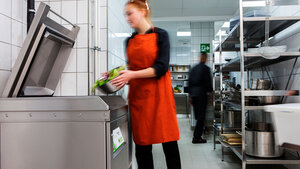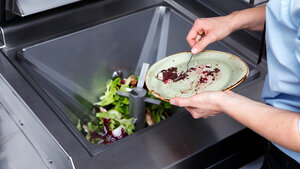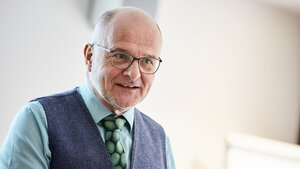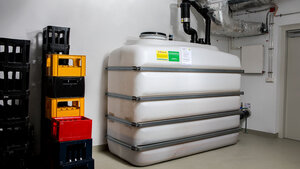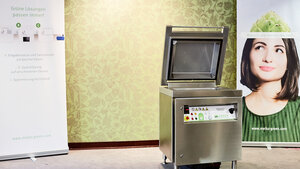Meiko Green Waste Solutions hosted a specialist kitchen planners' conference at the beginning of February in Durbach, Baden-Württemberg. An in-depth programme on the proper treatment of wet waste awaited participants in the run-up to Internorga. The result: based on the data available and the many advantages of food waste treatment, participants believe that the topic should always be a part of discussions on food service.
‘The people in this room are the people who will shape our industry,’ said Hannes Braun as he welcomed the many attendees to Meiko Green Waste Solutions' specialist kitchen planners' conference. Mr Braun is Head of Sales for Meiko in Germany and opened this festival of Green at the prestigious Hotel Ritter in Baden-Württemberg. Over the next day and a half, the programme was intense as participants soaked up vast amount of information on this complex and exciting topic.
‘We wouldn't have had a problem finding material for a whole week’, believes Mr Braun, ‘but we were able to round up the main themes.’ Of course, lively networking was also a vital part of this hectic programme, with attendees taking part in a cooking workshop – literally getting to grips with their subject. The focus was on bringing together theory and practice, drawing on several years of experience. The result was vivid, detailed and gripping. Topics included the biology of food waste, legal guidelines, biochemical processes and even how entire sections of rivers can become contaminated with microplastics if contaminants are not handled properly. A number of case studies were used to demonstrate just how relevant food waste treatment really is and the huge potential it offers in food service and in society at large.
Kitchen waste is not homogenous as our participants quickly discovered. Coffee grounds, peelings from just one type of fruit and fish skins are worlds apart and, in some cases, there has been extensive research into how to successfully treat a particular type of waste but not another. When biowaste is not properly sorted, the effects of different contaminants can equally be incredibly diverse, even scuppering entire complex treatment processes and preventing millions of tonnes for wet waste from being processed every year – and that includes biodegradable plastics. The potential is huge: let's assume that a restaurant produces an average of 500 meals a day. That would produce enough wet waste to provide electricity to four two-person households and heating to one two-person household every day!
The conference utilised high-tech kit to make the presentations interactive, with expectations of the event, participants' existing knowledge and the results of short smartphone questionnaires appearing live on screen. These techniques quickly made it clear that the top priorities for kitchen operators were hygiene, machine reliability, and investment and running costs. Meiko Green's expertise was therefore in high demand, with the company personally delivering knowledge from Offenburg to the conference delegates in Durbach. Dr Fritz Schneider, Head of Product Management at Meiko Green, explained the issues. He knows food service inside out, from the dining room down to the cellar. His ten years of experience in the company mean he also knows the pitfalls – and he didn't learn that in any textbook. You won't find information on food waste there. In fact, food waste is rarely mentioned in standards and legislation, yet the implications of these documents for food waste management are very real. ‘Research into the legal framework comes top of my list of what is needed’, says Dr Schneider. Laws, standards and guidelines on waste management regarding animal by-products, hygiene, water, waste water and composting are just a few of many building blocks which make up that framework.
Of course, there is a reason for all these regulations: ‘Food waste is highly aggressive and corrosive,’ explains Jürgen von Borzestowski of WET GmbH. Animal and vegetable fat and oil contained in waste water are deposited in pipelines and become incrusted. They also produce a corrosive biogenic sulphuric acid which can cause significant damage to sewers, leading local legislators who deal with municipal drainage to require the use of grease traps in commercial enterprises. The 250 m, 130 t fatberg found in London's sewer system is an example of what can happen if these requirements are not applied. To ensure the system remains closed, MEIKO GREEN allows for easy integration of grease traps into pump and vacuum systems.
CEO Patrick Hoffmann looks back over one and a half very successful days. ‘Within the industry, awareness of the potential of this area is on the rise, meaning that specialist kitchen planners and traders are spending more time focusing on wet waste. As that happens, everyone in business in the food service sector will benefit from improved hygiene, reduced work levels and lower resource consumption, be those benefits financial or improved conditions for employees. That is before we get onto the social benefits of being environmentally friendly in food waste disposal and recycling.’ For managing director of Burgerlich on Gänsemarkt in Hamburg, Sven Freystatzky, that fits in with his perceptions. Meiko Green's food waste treatment system will pay for itself within a few years. Mr Freystatzky believes the advantages are obvious: significantly improved hygiene, eliminating energy costs for cold storage and creating more space for the important things. After all, every inch is valuable in food service. Getting rid of bulky bins also improves workflows. You just throw everything into the feeding station, press the button and you're done. His conclusion: ‘Everyone in the food service business should get one of these machines.’
The delegates left the specialist kitchen planners' conference in Durbach with a whole host of new information which is likely to be relevant to the whole industry going forward. It is rare to find an issue like this with the potential to create such win-win solutions for both the food service industry and society at large. Visit us at Internorga, Hall 4, Stand 307, and see for yourself!








